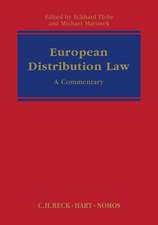The EU and Nanotechnologies: A Critical Analysis: Modern Studies in European Law
Autor Tanja Ehnerten Limba Engleză Paperback – 25 dec 2019
| Toate formatele și edițiile | Preț | Express |
|---|---|---|
| Paperback (1) | 271.68 lei 6-8 săpt. | +98.11 lei 6-12 zile |
| Bloomsbury Publishing – 25 dec 2019 | 271.68 lei 6-8 săpt. | +98.11 lei 6-12 zile |
| Hardback (1) | 570.83 lei 6-8 săpt. | |
| Bloomsbury Publishing – 9 aug 2017 | 570.83 lei 6-8 săpt. |
Din seria Modern Studies in European Law
- 19%
 Preț: 296.91 lei
Preț: 296.91 lei - 24%
 Preț: 440.21 lei
Preț: 440.21 lei - 31%
 Preț: 594.77 lei
Preț: 594.77 lei - 30%
 Preț: 570.22 lei
Preț: 570.22 lei -
 Preț: 181.55 lei
Preț: 181.55 lei - 30%
 Preț: 790.77 lei
Preț: 790.77 lei - 30%
 Preț: 507.97 lei
Preț: 507.97 lei - 30%
 Preț: 541.93 lei
Preț: 541.93 lei - 34%
 Preț: 509.45 lei
Preț: 509.45 lei - 30%
 Preț: 511.64 lei
Preț: 511.64 lei - 30%
 Preț: 721.14 lei
Preț: 721.14 lei - 30%
 Preț: 571.34 lei
Preț: 571.34 lei - 27%
 Preț: 475.10 lei
Preț: 475.10 lei - 30%
 Preț: 572.80 lei
Preț: 572.80 lei - 23%
 Preț: 418.50 lei
Preț: 418.50 lei - 11%
 Preț: 375.73 lei
Preț: 375.73 lei - 30%
 Preț: 575.75 lei
Preț: 575.75 lei - 19%
 Preț: 317.21 lei
Preț: 317.21 lei - 19%
 Preț: 296.72 lei
Preț: 296.72 lei - 18%
 Preț: 320.53 lei
Preț: 320.53 lei - 18%
 Preț: 321.66 lei
Preț: 321.66 lei - 30%
 Preț: 600.57 lei
Preț: 600.57 lei - 30%
 Preț: 512.22 lei
Preț: 512.22 lei - 30%
 Preț: 571.34 lei
Preț: 571.34 lei -
 Preț: 464.01 lei
Preț: 464.01 lei -
 Preț: 239.78 lei
Preț: 239.78 lei - 30%
 Preț: 538.03 lei
Preț: 538.03 lei - 30%
 Preț: 539.57 lei
Preț: 539.57 lei - 30%
 Preț: 595.65 lei
Preț: 595.65 lei - 30%
 Preț: 571.66 lei
Preț: 571.66 lei - 29%
 Preț: 587.97 lei
Preț: 587.97 lei - 30%
 Preț: 774.62 lei
Preț: 774.62 lei - 30%
 Preț: 570.43 lei
Preț: 570.43 lei - 30%
 Preț: 574.10 lei
Preț: 574.10 lei - 28%
 Preț: 495.80 lei
Preț: 495.80 lei - 30%
 Preț: 575.33 lei
Preț: 575.33 lei - 30%
 Preț: 571.24 lei
Preț: 571.24 lei - 30%
 Preț: 510.34 lei
Preț: 510.34 lei - 20%
 Preț: 219.19 lei
Preț: 219.19 lei - 30%
 Preț: 601.69 lei
Preț: 601.69 lei - 30%
 Preț: 513.60 lei
Preț: 513.60 lei - 18%
 Preț: 305.72 lei
Preț: 305.72 lei - 30%
 Preț: 972.83 lei
Preț: 972.83 lei - 30%
 Preț: 515.24 lei
Preț: 515.24 lei - 30%
 Preț: 539.99 lei
Preț: 539.99 lei - 30%
 Preț: 570.83 lei
Preț: 570.83 lei - 30%
 Preț: 571.82 lei
Preț: 571.82 lei - 29%
 Preț: 554.35 lei
Preț: 554.35 lei - 30%
 Preț: 572.06 lei
Preț: 572.06 lei
Preț: 271.68 lei
Preț vechi: 348.66 lei
-22% Nou
Puncte Express: 408
Preț estimativ în valută:
51.99€ • 54.67$ • 42.96£
51.99€ • 54.67$ • 42.96£
Carte tipărită la comandă
Livrare economică 17 aprilie-01 mai
Livrare express 12-18 martie pentru 108.10 lei
Preluare comenzi: 021 569.72.76
Specificații
ISBN-13: 9781509935659
ISBN-10: 1509935657
Pagini: 296
Dimensiuni: 156 x 234 x 19 mm
Greutate: 0.41 kg
Editura: Bloomsbury Publishing
Colecția Hart Publishing
Seria Modern Studies in European Law
Locul publicării:London, United Kingdom
ISBN-10: 1509935657
Pagini: 296
Dimensiuni: 156 x 234 x 19 mm
Greutate: 0.41 kg
Editura: Bloomsbury Publishing
Colecția Hart Publishing
Seria Modern Studies in European Law
Locul publicării:London, United Kingdom
Caracteristici
This book offers a legal framework for regulation in the field which would ensure greater transparency and accountability.
Notă biografică
Tanja Ehnert is a legal officer at the EU Ombudsman.
Cuprins
1. Setting the Scene: Nanotechnologies and their Regulation at the EU Level I. What are Nanotechnologies? II. Between Nanomania and Nanophobia III. Risk as a Rationale for Regulatory Intervention IV. The EU's Approach to the Regulation of Nanotechnologies: A Bird's Eye Perspective V. Conclusion 2. Regulating in Today's Nano Society I. Embedding the Regulation of Nanotechnologies in Its Societal Context II. Regulating in Today's Nano Society: Two Theoretical Accounts III. Translating the Debate to the EU Level IV. Conclusion and Next Steps 3. Analysing EU (Risk) Regulation through the Lenses of Regulatory Capacity I. Defining the Object of Analysis: 'EU Regulation' II. Putting on the Analytical Lenses of Regulatory Capacity III. Conclusion 4. Nanotechnologies in Food I. Nanotechnologies in Food II. The EU Regulatory Framework for Nanotechnologies in Food III. Analysing the EU's Regulation of Nanofoods through the Lenses of Regulatory Capacity IV. Conclusion 5. Nanotechnologies in ChemicalsI. Nanotechnologies in Chemicals II. The EU Regulatory Framework for Nanotechnologies in Chemicals III. Analysing the EU's Regulation of Nanochemicals through the Lenses of Regulatory Capacity IV. Conclusion 6. Conclusion I. Regulating in Today's Nano Society: The Point of Departure II. Spotlight on the EU Executive III. Main Findings of the Critical Analysis or the Pitfalls of 'New Governance' IV. Repercussions for the Meta-Theoretical Level: Is 'New Governance' 'Better Governance'? V. Strengthening Regulatory Capacity: Proposals for Reform at the Micro Level VI. Three Facades of EU Risk Regulation VII. Outlook
Recenzii
I recommend the book to academics in the fields of law and social sciences as well as to practitioners with an interest in EU's handling of new technologies and in EU policy design in general. Specifically, the book presents an abundant source of case material highlighting the desirability of a single legal framework for EU administrative procedure.

















